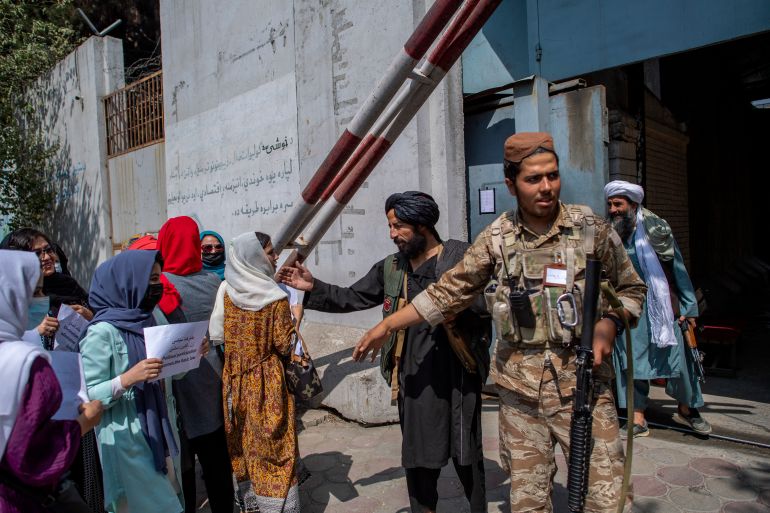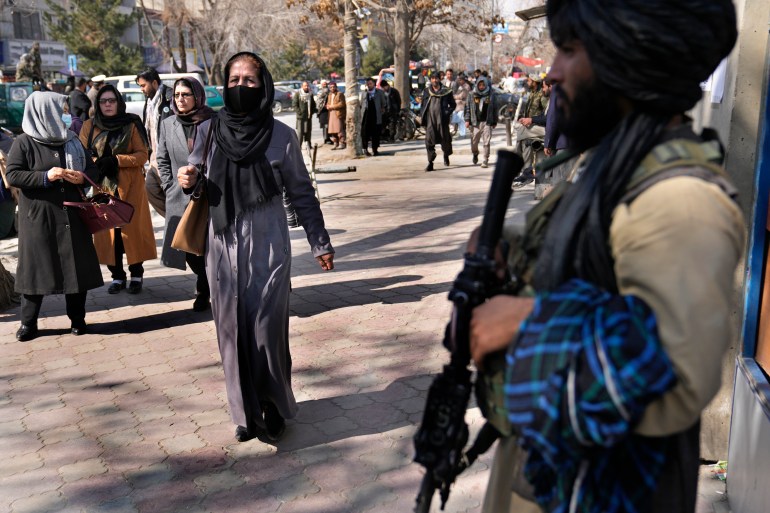Afghan women’s long and hard struggle for the right to divorce
Women had struggled long and hard for the right to divorce, but since the Taliban returned to power last year, the situation worsened.

After years of abuse at the hands of her husband, 32-year-old Bano gathered the courage last year to file for divorce in northeastern Afghanistan.
“For four years, he beat me every day and raped me every night,” she told Al Jazeera, requesting that her name be changed because she is in hiding from her abuser. “If I resisted, he would beat me more.”
Keep reading
list of 4 itemsUS will not fund non-state actors in Afghanistan: Taliban sources
Taliban signs ‘preliminary’ deal with Russia for oil, gas, wheat
Taliban official calls for schools to be reopened for girls
“He would humiliate and insult me because I could not get pregnant,” she said. “When the doctor told us that he was the one who needed fertility treatments, he came home and kicked me between the legs, blaming me for being barren.”

Just as Bano’s case was scheduled for a court hearing in Takhar province, the government collapsed in August 2021 and the Taliban returned to power.
“The judges were gone, the lawyers were gone, and with the help of the Taliban, my husband forced me to return to his house, threatening to kill my family if I didn’t,” she said.
After their takeover, the Taliban dismantled the existing judicial system, appointed their own judges and implemented their own version of Islamic law.
“There are no female lawyers operating any more, and none of the female judges has been allowed back to work,” said Marzia, a female judge before the Taliban takeover. She is also in hiding.
Taliban prejudice
Afghanistan had more than 300 female judges presiding over judicial departments that ranged from women’s issues to criminal and terrorism-related cases. Several hundred judges have since escaped to other countries, and some 70 female judges – if not more – are in hiding and unable to return to work.
“They tell us it is because they believe we [female lawyers and judges] are incompetent and do not have enough knowledge of Islamic law to work in this field,” Marzia said.
The Taliban acknowledged this position during a September news conference in which Hizbullah Ibrahimi, the head of the Taliban Supreme Court’s research and inspection directorate, dismissed the need for female judges.
“In the previous system, female judges decided cases based on specific laws and bills and did not have enough knowledge about jurisprudence and Shariah principles,” he said. “… We have not felt their need until now, and we have not understood the need for women judges to return.”
Marzia accused the Taliban of being prejudiced against women and failing to provide women their Islamic rights, including divorce.
“Without women in the judiciary, female victims cannot seek formal help and relief from the courts,” she said. “They don’t have access to their basic rights such as divorce. It is a big loss for women’s rights but also human rights as a whole. A significant population of the country has been cut off from accessing legal support.”
Justice ministry spokesman Abdul Hameed Jahadyar told Al Jazeera that divorce and family violence cases have been heard in the past year.
In Kabul alone, he said, 341 divorce cases “were settled”. He did not clarify how many divorces were actually granted.
“Any woman who wants to get a divorce can hire a male lawyer, and their case will be dealt with,” Jahadyar said. “In divorce cases, we first try to make peace between the parties and reconcile them.”
Large gender gap
The lack of women in the Afghan judiciary has left a severe gap in who has access to the justice system in Afghanistan, said Kevin Schumacher, deputy executive director of Women For Afghan Women (WAW), a United States-based non-profit organisation that works on violence against women and provides psycho-social and family counselling.
Before the Taliban takeover, WAW also provided legal support for families and operated shelters for women and children escaping abuse. Since then, however, the organisation has been forced to close down 16 shelters and 12 family guidance centres. The Taliban seized the properties, alleging that they were being used as brothels and promoting immorality.
Schumacher said that simply wasn’t true. “We were providing safe spaces along with counselling, mediation, family guidance and legal support,” he said.

“The forced closure of our domestic violence shelters left hundreds of our existing female clients in legal and social limbo,” he said. “These state-mandated shot-downs also brought thousands of ongoing family mediation and counseling services to an abrupt end.”
Many of the shelter clients had no choice but to go back to their families or reintegrate into a society where there is no social support network for them and no legal advocates to help fight their cases.
While the situation for Afghan women was not ideal prior to the Taliban takeover, Schumacher and Marzia argued that things have since gotten worse.
“The Taliban government wants to adhere to the Islamic rules, but they haven’t codified these laws,” Schumacher said. “As a result, no one knows for sure how to go about seeking or implementing justice. With a lack of judicial procedure, there’s discoordination, which is most affecting women’s access to justice.”
Stigma
Marzia said seeking a divorce in Afghanistan has always been a challenge for women.
“There is stigma towards the women, lack of awareness of their rights and also a general lack of compassion among police and judicial officials, but despite that, there were some protections in the form of institutions and mechanisms that women could appeal to,” said Marzia, who heard many divorce cases during her career as a judge.
“Those few reliefs are also gone,” she said, adding that she knew of cases over the past year in which Taliban judges denied divorces to women because they believed women do not have that right.
“These women were forced to go back to their abusers who would hurt them even more as revenge for going to the courts,” she said.
Bano said she had a similar experience when she approached the Taliban courts recently after enduring more violence from her husband.
“About two months ago, he came home under the influence of opium and slapped me several times,” she said on the phone. “When I screamed, he went to the kitchen, heated a knife and burned my breasts with it. He then locked me in the bedroom and left. I was in a lot of pain, and the neighbours heard my wails and broke me out and took me to the clinic.
“Two weeks later, when my wounds had yet to heal, he brought a wild dog home. He then tied me to the ground, and let the dog claw my whole body as he laughed at me, saying, ‘Are you going to sue me now?’ My cheeks were torn and my eyes were swollen.”
Bano spent that night writhing in pain and begged her husband to let her go to the clinic the next morning. When he agreed, she grabbed the opportunity to escape. She took a bus to her brother’s home in a neighbouring province.
“When they saw my condition, they were shocked,” she said. “My mother fell to the ground.”
On the advice of an imam, they approached the local Taliban court.
“I went to the Taliban judge to show my mutilated face and body,” Bano said. “We thought that perhaps after witnessing the signs of my husband’s cruelty, they might offer me protection. Instead, a Taliban member called me a b**ch and cursed me for showing my face.”
“When we told them that we had applied for divorce with the previous courts, they beat my brother and me with the bottom of their guns for filing a case in the ‘infidel’s court’,” she said.
There is no such thing as a divorce in our court, they told her. “The judge said, ‘Your husband has the right to treat you however he likes because you are his wife. Even if he kills you, you have no right to get a divorce,’” she said.
The Taliban threatened to detain her and hand her over to her husband, Bano said, but before they could do so, she and her brother were able to flee the province with the help of the imam and remain in hiding, fearing for their lives.
“With the brief experience I had dealing with the previous courts, the situation was so much easier for women like me, to get a female lawyer, approach the courts with women judges and get a divorce, which is my Islamic right,” Bano said. “But with the Taliban in power, life is hell for women once again.”